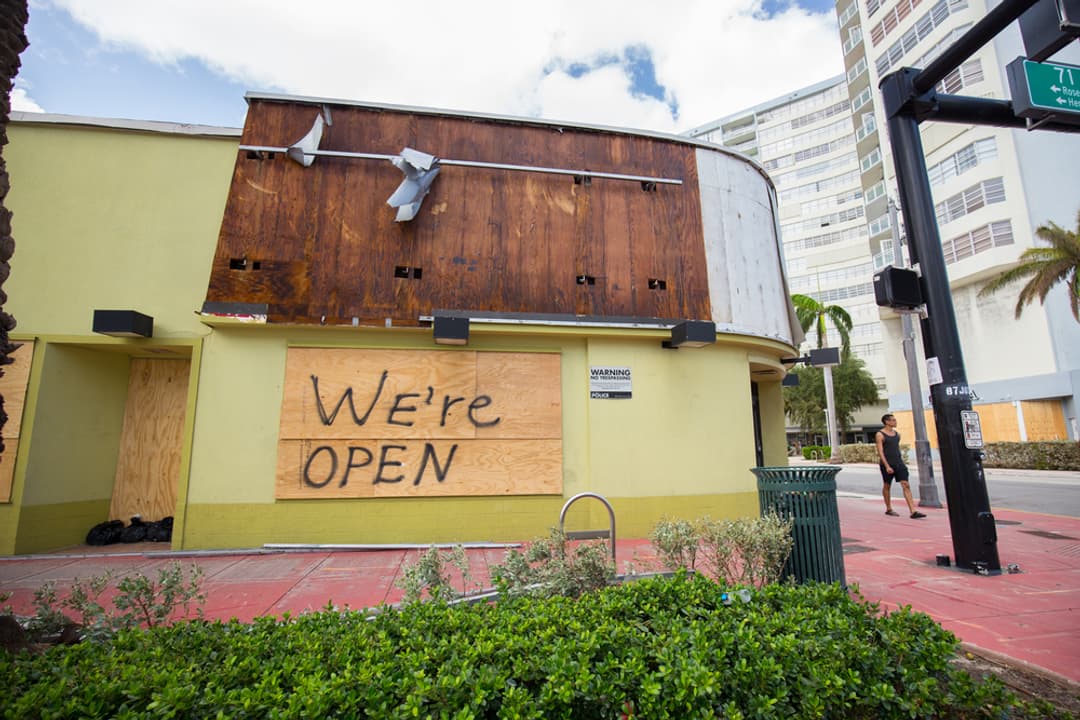Do hurricanes dampen or devastate the job market?
In late August 2017, Hurricane Harvey brought record rainfall to Houston and the surrounding areas along with damaging winds of up to 130 mph. Then Hurricane Irma swooped in and pounded Puerto Rico and headed for Florida with ravaging winds of up to 185 mph, not to mention the devastation from hurricanes Jose and Maria.

In late August 2017, Hurricane Harvey brought record rainfall to Houston and the surrounding areas along with damaging winds of up to 130 mph. Then it felt like we blinked and Hurricane Irma swooped in and pounded Puerto Rico and headed for Florida with ravaging winds of up to 185 mph, not to mention the devastation from hurricanes Jose and Maria.
It takes months — even years — to completely recover from the damage that hurricanes can bring. Just now Houston’s two large federal water reservoirs have finally been emptied of the massive amount of floodwater brought by Harvey. Irma has left much of Puerto Rico without power, and many Florida residents have lost homes to flooding (not to mention hundreds of boats sunk around the Keys).

The cost of a hurricane can quickly reach billions of dollars. Property losses are only one part of the overall impact. A hurricane halts virtually all aspects of life, including the job market. When people can’t work and new positions can’t be filled, it deeply affects the recovery process.
Economists searching for job market insights into just how much Harvey and Irma will impact the market in affected areas should look to historic job data to inform their predictions. By looking to the past, we can get a better sense of what to expect in the future.
To better understand what the upcoming months may bring, the LinkUp analytics team reviewed job openings in areas hit by major hurricanes in the past five years, meaning a hurricane that resulted in more than $10 billion in damage. There have been four hurricanes in the last five years that meet that definition.
- Hurricane Sandy: New Jersey and New York (10/29/2012) — $75 billion in damage
- Hurricane Matthew: SE Florida, Georgia, North Carolina, and South Carolina (10/6/2016) — $10 billion in damage
- Hurricane Harvey: Texas (8/25-26/2017) — more than $70 billion in damage
- Hurricane Irma: Florida, Georgia, South Carolina (9/10-11/2017)— more than $50 billion in damage
Labor Market Insights from Hurricane Sandy
Analysis shows that Sandy had a bigger impact on job openings than Matthew. As you can see in this graph, job openings in Atlantic City, New Jersey and New York City dropped right after the hurricane, which continued for roughly four months. Job openings didn’t start to recover until March 2013 (five months after Sandy hit).

The tourism industry was hit hardest by Sandy. Hotels in lower Manhattan and all along the Jersey Shore had to close for weeks due to no electricity and extensive water damage. In the New York metropolitan area, major hotel chains such as Marriott and Hilton reduced their number of job openings by almost 100 positions between October and November 2012.
Hotels all along the boardwalk in Atlantic City had to shut down for days before and after Sandy. Job openings in the accommodation industry declined 40 percent from October to November 2012, driven by some of the major casino resorts in Atlantic City: Caesars, Atlantic City Hilton and Trump Plaza Hotel.
With the lack of tourists, other tourist-driven industries suffered as well, such as food services. For example, HMSHost Corp., which services food and staff at rest stops along the Garden State Parkway and the New Jersey Turnpike as well as the Newark airport, reduced their number of job openings by 30 percent in November and December 2012.
Although LinkUp job market data does show a clear impact on job openings from Hurricane Sandy, the Bureau of Labor Statistics concluded that Hurricane Sandy did not substantively impact the national employment and unemployment estimates for November 2012. Therefore, the impact was mainly regional.
Labor Market Insights from Hurricane Matthew
The impact on job openings after Matthew is not nearly as clear as it was after Sandy. We do see a slight dip in jobs after Matthew, but it looks like job openings rebounded by November 2016.

There are several reasons that job openings may not have been as impacted by Matthew in comparison to Sandy. First, Matthew hit smaller, less populated areas. Second, it hit during the tourist off-season in areas like Savannah, Georgia, and Myrtle Beach, South Carolina. That means there was less demand on tourism-related businesses.
Assumptions for Harvey, Irma and the future
LinkUp job data shows Sandy had a huge impact on job openings but Matthew did not. Like Matthew, so far Harvey and Irma have not had much of an impact on the job openings, which is a positive. What we can conclude from this analysis is that when major hurricanes hit in tourist areas during peak travel periods, it looks like the first industries to cut back on job openings are the tourist-driven ones: accommodation and food services.
LinkUp will continue to monitor the job situation in the Houston region as well as in Florida, and explore the further impact of Hurricane Maria on Puerto Rico. We will follow up this blog post with another one next quarter to see if jobs are still increasing in areas impacted by Harvey and Irma.
Insights: Related insights and resources
-
Blog
08.05.2021
Bid/Ask Spread in Job Market Narrowing; July Non-Farm Payrolls Will Surprise to the Upside
Read full article -
Blog
06.26.2020
What Federalism Looks Like in 2020
Read full article -
Blog
03.26.2018
LinkUp Forecasting Net Gain of 235,000 Jobs In March; Wage Inflation Will Accelerate in Months Ahead
Read full article -
Blog
11.25.2017
Job Market Impact Of Harvey and Irma Pales In Comparison To Hurricane Trump
Read full article -
Blog
10.26.2017
The New Abnormal Is Wreaking Havoc on Job Market Forecasts; LinkUp Predicting Net Gain of 120,000 Jobs In October
Read full article -
Blog
09.28.2017
LinkUp Forecasting Net Gain of 260,000 Jobs For September
Read full article
Stay Informed: Get monthly job market insights delivered right to your inbox.
Thank you for your message!
The LinkUp team will be in touch shortly.
